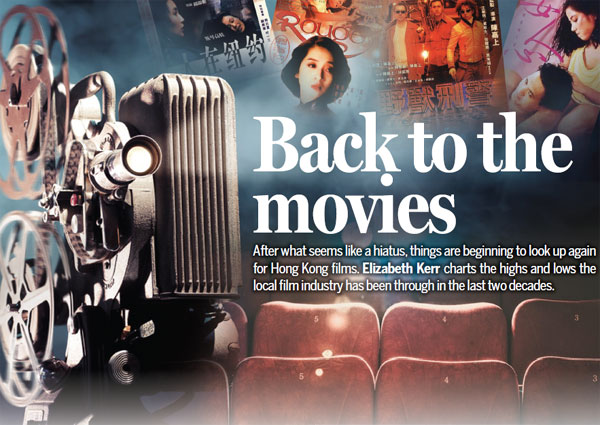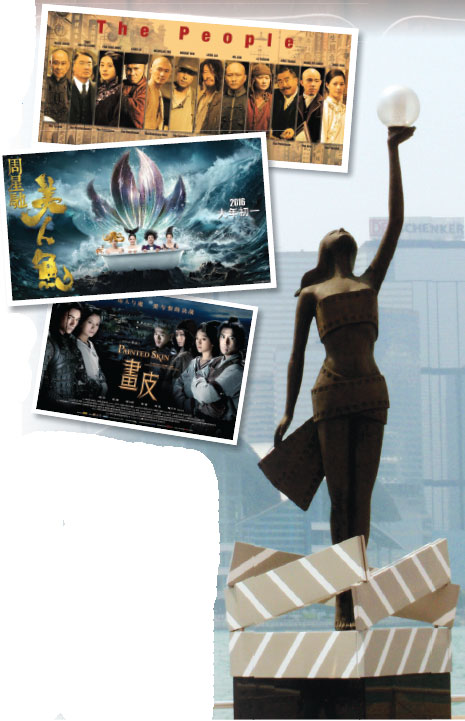Back to the movies
Updated: 2017-05-05 06:37
By Elizabeth Kerr(HK Edition)
|
|||||||
After what seems like a hiatus, things are beginning to look up again for Hong Kong films. Elizabeth Kerr charts the highs and lows the local film industry has been through in the last two decades.
Odd as it may seem now, it wasn't too long ago that some of the world's best filmmakers were looking to Hong Kong for guidance and inspiration.
"I was fortunate to follow in the footsteps of Patrick Tam, Ann Hui, Yim Ho at TVB in the late 1970s," recalls producer-director Stanley Kwan, who debuted in 1985 with the acclaimed and popular Women. "We refer to the time between the early '80s and early '90s as the golden era of Hong Kong cinema - big stars, diverse subjects, mass appeal - and we survived on just the local market." It was also an industry that cranked out upwards of 300 films a year and had overseas niche markets in North America and Europe. "Hong Kong's was a highly recognized cinema."
Flash forward 20 years or so and the picture is very different. "The whole environment has changed. When I made Beast Cops (in 1997) I thought it could be my last film. Piracy was at its height, box office was really awful," says producer, director and current Media Asia CEO Gordon Chan. "I won my first directing award but it was my first film that lost money. It was really weird They were selling pirated VCDs of films at HK$6 a piece where I was shooting and I thought, 'I'm going to lose my job.' Then I thought maybe it was time for me to start talking about our society."
Immediately after the handover in 1997, the local film industry was in a flux, but it has managed to reinvent itself since and is slowly finding a new groove, although it may not be so apparent just yet.

In 2016, 61 Hong Kong-made films were released in the HKSAR, compared to 287 from outside of Hong Kong. The local film industry employed just over 16,000 people, according to the Hong Kong Trade Development Council. Also, in the same year, 89 co-production permits were issued under the Closer Economic Partnership Arrangement, enabling Hong Kong film industry professionals to work on the Chinese mainland - a trend many apprehend might signify the end of Hong Kong cinema whose distinctive features had captured the imagination of the world's film-goers not too long ago.
Things have changed drastically in the last two decades. As production costs are high in Hong Kong, scores of filmmakers from the city have considered getting into co-productions with studios on the mainland. It wasn't all smooth sailing though. China's State Administration of Press, Publication, Radio, Film and Television (SAPPRFT) asks co-production aspirants to fulfill certain conditions before they flag off a project. Then this may not be such a bad thing for Hong Kong films.
Competitive edge
For one, investors who find it difficult to work out the modalities of getting past the rules set down by SAPPRFT might turn their gaze at the Hong Kong film industry instead.
"I'm hopeful funders from the Chinese mainland will consider producing in Hong Kong. Not all mainland financers are focused on the market alone," theorizes Kwan whose LGBT-themed Hold You Tight was screened at the just-concluded Hong Kong International Film Festival. "Many are looking for quality and Hong Kong filmmakers still have an edge in picking scripts and subjects, and in crafting genre films," says Kwan.

"I always say that not only are directors chosen by financers, directors choose their financers too," he adds. "They need to be on the same path, and directors need to stand up for themselves. Go for a lower budget if it means not casting someone wrong for the part just because the finance people like them. There has to be compromise."
Kwan draws attention to the presence of several films made by Hong Kong directors among the top 10 box office hits on the mainland last year. According to the trade journal The Hollywood Reporter there were five of these in the top 10: Stephen Chow's Mermaid, Cheang Pou-soi's Monkey King 2, Dante Lam's Operation Mekong, From Vegas to Macau 3 by Wong Jing, and Daniel Lee's Time Raiders.
While the ranking has been good, the box-office takings have declined. Earlier, Gordon Chan's Painted Skin, Teddy Chen's Bodyguards and Assassins, and Peter Chan's Wu Xia all fared well, but the honeymoon seems to be coming to an end. Box office receipts plunged in the mainland in 2016, growing by just 4 percent compared to 49 percent in the previous three years, according to The Hollywood Reporter.
Turnaround ahead?
And yet Hong Kong's film industry might be poised for a turnaround: here's why.
With financiers from the mainland now able to fund the films produced there, financiers here in Hong Kong might once again be looking to fund locally produced movies. Indeed, the big studios are starting to put money back into the local industry - a boon for local filmmakers. The end result has been to trim the fat while cultivating a more inward looking industry - to try and reclaim its place among the world's leading industries.
"We're still here. There's still a Hong Kong film industry," says Chan. He thinks the industry, which makes fewer films now, has seen a general lifting of standards since the time of producing 300 films a year. "We were just punching out trash, and not much good came out of it. Now, maybe a third of the films made come from the heart of directors, of creative people. I like what I see," finishes Chan.
As Kwan sees it, 1997 may be a landmark, but the industry had started to shift in anticipation. "There was a nostalgic layer about Hong Kong films by 1989 that was already pining for the so-called 'old' Hong Kong. It's in Rouge too," admits Kwan, noting that nostalgia is back, and is informing the work of emerging filmmakers.
"Young filmmakers obviously love Hong Kong. They have strong feelings and want to tell stories about Hong Kong. Unlike the films from the '80s they're more direct.
Younger directors have a drive to make locally specific films, and they often don't worry about getting a release in the mainland."
Chan, however, feels the young filmmakers of today would do well to care about releasing their work on the mainland, as well as in the United States, Europe and so on, for that matter. "Audiences don't go to the cinemas for knowledge or culture.
Talking about Hong Kong doesn't mean the film's going to sell," he argues, insisting on the importance of producing cinema that resonates with a larger audience.
"When I first started working, we all talked about showing the films overseas. We were always challenging ourselves to make sure the film could be appreciated by anyone, from any cultural background, and I don't think we should give that up," adds Chan.
The glory days when Hong Kong was a cultural vanguard are gone. From the 1960s well into the 1980s, for instance, "people would look, and wonder what Hong Kong's filmmakers were saying," says Chan.
"Hong Kong's peculiar voice is important, respecting independent voices is important. It still has its cultural influence and spiritual power, which is important. That's why the Hong Kong film industry is still special, and still worth reckoning with," Chan adds.
(HK Edition 05/05/2017 page7)